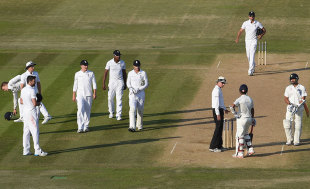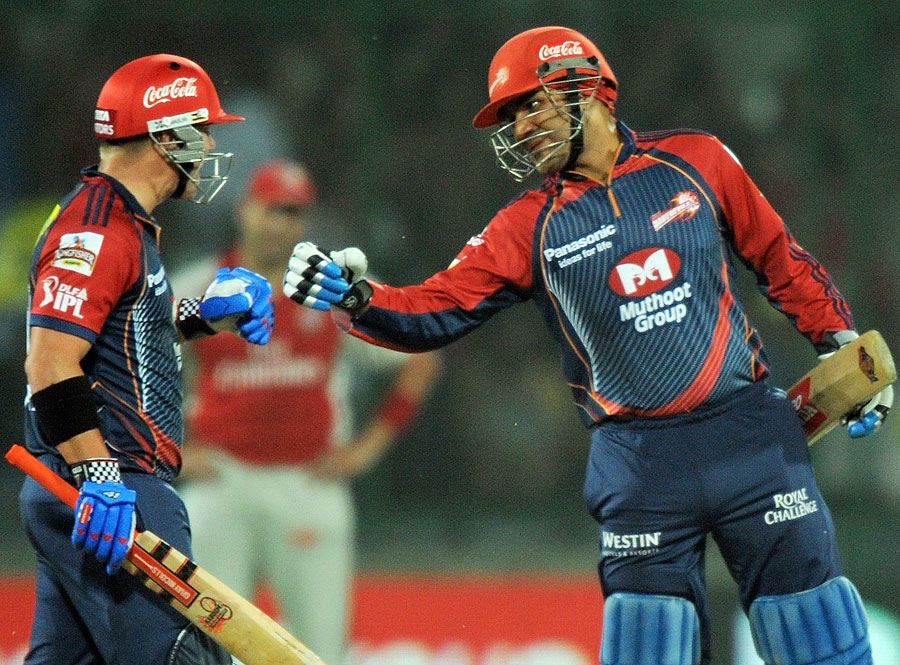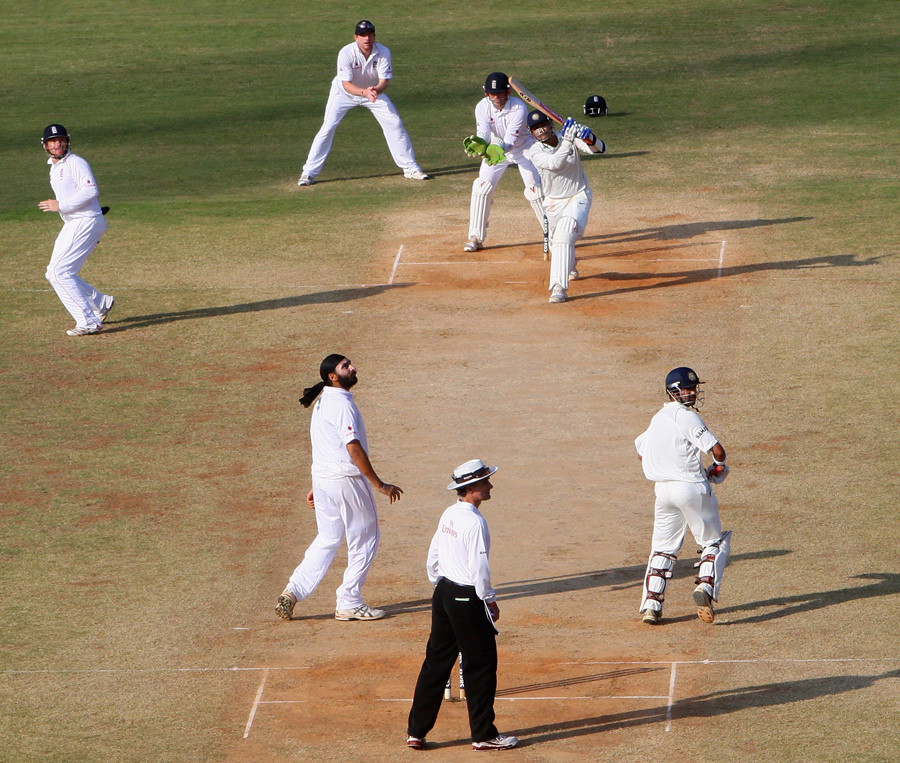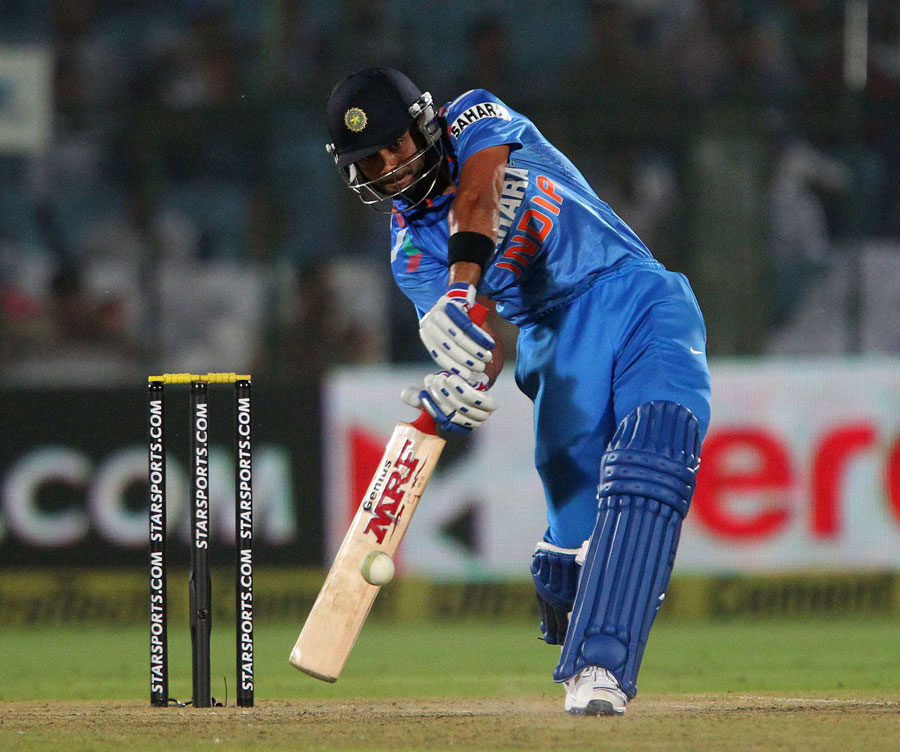There is an uncomfortable recognition that the beauty of James Anderson's cricket comes with a professionalism that has been taken to the limits but weak umpiring has to share the blame
As James Anderson prepares to face an ICC enquiry into his alleged misconduct during the Trent Bridge Test, it is hard to suppress a feeling of frustration about how this wonderful fast bowler has been allowed to become England's guilty pleasure.
Anderson is close to the apex of a fulfilling career, only 12 more wickets needed to draw equal with Ian Botham as England's leading Test wicket-taker. He is championed in England as a true craftsman among fast bowlers, a manipulator of a cricket ball who deserves to stand alongside the best.
And yet, this faith in his bowling purity sits uneasily with a sullied reputation; a player now well known to all but the most casual follower of the game as one of the most ingrained sledgers around and, a natural development, who allegedly has now tipped over into the pushing of Ravindra Jadeja as well. It does not take long to find an opponent, or a past opponent, who says there is nobody worse - even if they then admit it is a crowded field. It should never have come to this.
This then is England's guilty pleasure: on one side, the shy craftsman who became one of the finest fast bowlers in the world; on the other, the Burnley Lip, whose abuse of opponents has been incessant for many years. Many in the game will tell you it doesn't matter a jot. It does. Cricket has a problem - and it needs to deal with it before everybody starts to grow Luis Suarez fangs.
It is important to observe - and his captain, Alastair Cook, was shrewd enough to do so from the start - that the ICC code of conduct commissioner, Gordon Lewis, a retired Australian judge, has been appointed to judge one specific incident at Trent Bridge, about which the details remain at issue, and not to pass opinion on a verbally-strewn career.
The ICC's judgment, in the simplest terms, will determine whether Anderson is banned from his home Test at Old Trafford next week, and perhaps for the rest of the series. For many, that outcome is all that matters. It might swing a Test series towards India in the process, although the suggestion that this is India's reasoning is overly cynical.
This is not a tactic; this is a campaign. And once Lewis makes his ruling, we will wait to discover if it is the first campaign of many or if Anderson is to be its sole victim. A trophy killing for India's mantelpiece.
Anderson's fate will be determined on whether video evidence really does exist - India say so, but they might be bluffing - and on the dubious testimony of witnesses about Who Pushed Who When, Who Said What To Whom, all of which tittle-tattle should be enough to make Lewis wonder whether he should be doing better things with his life.
Cricket's fate will take longer to determine. What we may also be experiencing is the start of India agitation against persistent on-field abuse, a habit resented for its disrespect and occasionally because of its implied threat of physical violence. The reality is that only India is empowered to change the nature of the game - to say "we will not play this way". What is less unclear is whether it has the will to try to transform the way the game is played - or whether perhaps Lewis' ruling will carry wider encouragement for cricket to clean up its act.
We may know a lot more about the repercussions by Christmas. If India, and in particular their captain MS Dhoni, have taken a stand against what they regard as Anderson's excess, how will they respond when India pitch up for a Test series in Australia? They have acted independently of the umpires and match referees once. If Lewis rules in their favour, will they feel obliged to do it again?
If Mitchell Johnson snarls from underneath his vaudevillian moustache, will India be consistent and immediately lay a charge with the ICC? If David Warner yaps like a dog for much of a session, as he once stupidly did to irritate Faf du Plessis, will another charge be laid? If Shane Watson adds some sly words of his own, will three Australians be in the dock?
| 
| Was Ajinkya Rahane's melodramatic response at the end of day four a sign of India's zero tolerance approach to verbal abuse? © Getty Images |
| Enlarge
|
|
|
Anderson's alleged push of Jadeja is presented as the catalyst for the complaint, but it was his reputation as a serial sledger that made Dhoni so anxious to pursue it. Anderson was charged because he has form - the alleged push was just a chance to get even. And physical contact, incidentally, is not necessarily needed to win a case. There is plenty in the ICC Code of Conduct that pretends to punish verbal abuse. It is just that nobody ever presses charges.
While England is invited to regard Anderson as a guilty pleasure, international umpires and the ICC must be feeling nervous. If India is embarking upon an attempted clean up, the umpires will need to intervene in a manner they have not seen fit to do for years. If they do, it will be long overdue. What we have at the moment is a sham.
So much in cricket is disingenuous. The Spirit of Cricket has become a widely-ridiculed moral salad dressing on a game where umpires allow verbal aggression to go unchecked in the misguided belief that they are permitting the vital confrontational elements that enhance the game at the highest level. As long as the invective isn't aimed at them, as long as nobody actually makes physical contact, they are only concerned with ensuring the public does not know too much.
Most of us - at whatever level we play the game - relish a clever sledge, most of us permit a physically-straining fast bowler a display of frustration, most of us don't mind a bit of backchat, but umpires have utterly failed in their duty to check the incessant boorish behaviour that has now become regarded as just a daily reality. Where were they when Anderson indulged in his 30-metre rant at Jadeja as the players walked off for tea? Where is the dividing line? Is everything acceptable unless you actually push someone? It is time we were honestly told.
Instead, we have Anderson, the essentially gentle guy trying to play tough; the diffident figure who has been told by coaches to become more aggressive; the man who could barely spit out a sentence in press conferences at the start of his career, transformed into a venomous on-field malcontent; a natural leader of no-one proudly bowling more Test overs than anyone in the world as he forever strives to be the Leader of the Attack; a talented, likeable lad who has been gradually lulled by this failure of umpires and administrators to rule and has developed, in his immense desire to win Tests for England, into a twisted, nastier on-field personality than he really is.
Considering all the jokes about his grumpiness - his best mate, Graeme Swann, loves to joke that it takes a couple of beers to cheer him up - this role play does not seem to have made him very happy.
As England celebrated an overwhelming victory at the Ageas Bowl, Anderson's hugs with his team-mates seemed slightly troubled. A few minutes later, he was collecting another magnum of champagne, another man-of-the-match award logged. He had produced his finest all-round performance for a year, a display summoned out of adversity, adversity not just for himself, but for his captain, Alastair Cook, and indeed the entire England Test set-up.
| | | | |
| |
| While we cherish Anderson's skill, we prefer to be spared a truth. The abuse has become the sourness we would rather not recognise |
| |
| | |
|
It was a pleasure to see Anderson and Stuart Broad remembering once again how to play with joy - "play with the happiness of your first Test," the coach, Peter Moores had urged them as he sought to arrest England's worst run for 20 years, and England's senior players, as one, had released the yoke from their back. England kept their lips buttoned - and won by a country mile.
But on the one occasion that Anderson allowed himself some backchat - a sentence or two to Ajinkya Rahaneat the end of the fourth day - the response from Rahane was so melodramatic that India's zero tolerance policy was abundantly clear. Was this personal animosity, a tactical manoeuvre ahead of the hearing or further proof a long-term attempt to change the nature of the game?
Anderson's post-match interviews, as ever, were conducted in that vulnerable, polite, halting style. It is the Anderson that England wish to celebrate: the self-effacing, bashful sportsman who has succeeded in a physically-demanding, confrontational job. We would rather dwell on his 371 Test wickets and not wonder about his tally of C words when the game gets tough.
His newly-adopted beard looks like a defence mechanism against the uproar surrounding him. When he was asked after the match if he was confident about the outcome of the hearing, his "don't know" response sounded abashed. There was no petulant strut, no words of defiance, just a world-class player trapped in a behavioural mode that might be about to bring suspension.
While we cherish Anderson's skill, we prefer to be spared this truth. The abuse has become the sourness we would rather not recognise: the stain on the luxury, hand-woven carpet; the dodgy financial dealings that produce the beautiful marina; the uncomfortable recognition that the beauty of Anderson's cricket comes with a professionalism that has been taken to the limits. The alleged push has finally forced us to take notice.
We all know this: fans, team-mates, opponents, former players, umpires, administrators, all playing our part in this endless charade.
The ECB defends Anderson because it wants to win the series and protect its players; no thoughts here - not publicly anyway - of the wider picture. The ICC just bleats that the authority of the enquiry has been compromised because both Dhoni and Cook have passed comment on the situation, more concerned with systems and processes than the long-term health of the game.
Meanwhile, James Anderson, is hung out to dry.
And nobody is imposing, for all of us to see, the behavioural standards by which the game should be run.




